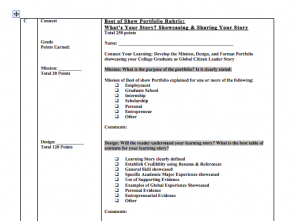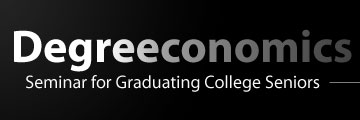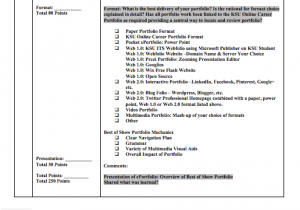Sloan Certificate Program: Draft of KSU 4401: Senior Seminar Syllabus – Online Course
KSU 4401: Senior Seminar Syllabus
KSU 4401: Senior Seminar
Instructor Contact Information:
Dr. Joan E. Leichter Dominick
Associate Professor of Communication
Senior-Year Experience Course Coordinator
Department of University Studies
Office: LB 417
Office Hours: By appointment made through Desire2Learn email
Preferred Communication Channel: email through Desire2Learn
Expected Communication Reply Time: Within 24 hours Monday through Friday
Faculty Website: http://joandominick.com
Course Meeting Times: Varies per Semester
_______________________________________________________________________________________________
Course Structure:
Course Overview:
KSU 4401: Senior Seminar is an eportfolio-centric course assisting college seniors transitioning to post-university life. Students develop the life-long learning habit of digitally archiving, assessing, and sharing their learning by creating an eportfolio to honor, understand, and connect their learning from self to global society for the betterment of both. KSU 4401 Senior Seminar is to provide college seniors with an opportunity to reflect on and provide closure to their collegiate educational experience, demonstrate proficiency, develop the skills necessary to successfully transition to and navigate post-university life, understand the civic and social responsibilities of being college educated global citizens and connect with Kennesaw State University in an ongoing alumni relationship.
_______________________________________________________________________________________________
Course Learning Outcomes:
Reflecting on Your College Experience
1) Students will reflect on and be able to express and integrate the personal and professional meaning of their collegiate educational experience, particularly in the area of skills acquisition (e.g., leadership, communication, teamwork, etc.) (knowledge, attitude and skill outcome)
Designing a Career Plan
2) Students will have developed a plan for pursuing their selected career path based on the awareness of the variety of post-graduate choices available to them. (knowledge & skill outcome)
3) Students will possess the tools needed to conduct an effective search for a career, graduate school or other post-graduate choice (e.g., resume writing, interviewing skills, etc.). (knowledge & skill outcome)
4) Students will be exposed to the resources, services and networking opportunities dedicated to ensuring their success not only while they are KSU seniors, but also after they exit the institution (e.g. Career Services Center, Alumni Association, etc.). (knowledge outcome)
Transitioning to Post-University Life
5) Students will have learned about the academic history and traditions surrounding commencement. (knowledge outcome)
6) Students will be familiar with cycles of change and transition and life skills (e.g. stress management, financial planning, etc.) which will help them make a successful transition to their post-university life. (knowledge & skill outcome)
7) Students will understand the importance of civic and social responsibility and embracing a global citizenship perspective. (knowledge & attitude outcome)
_______________________________________________________________________________________________
Course Video Overview:

KSU 4401: Senior Seminar Video Overview with Dr. Joan E. Leichter Dominick
_______________________________________________________________________________________________
Course Design:
KSU 4401: Senior Seminar is delivered online learning community design to provide college seniors preparing for graduation with a semi-cohort group sharing the experience for preparing for life after college. The coursework is designed in an asynchronistic, which are self-paced with deadlines, and synchronistic, which are in real-time, environment to provide opportunities for learning individually, peer-to-peer, and in community, which reflects their roles career and citizenship.
_______________________________________________________________________________________________
Course Textbook:
You will not be purchasing a textbook for the class. The course text is on the Georgia VIEW Vista Homepage entitled:
The Complete Graduate: A Workbook for College Seniors by K. Andrews, J. Leichter Dominick, D.Smith (2003). Second Edition. Kendall/Hunt Publishers: Dubuque: Iowa
_______________________________________________________________________________________________
Course Materials and Resources:
KSU 4401: Senior Seminar Course Website:
Degreeconomics: http://degreeconomics.com/
KSU 4401: Senior Seminar Course Website Resource:
The Complete Graduate Resource: http://thecompletegraduateresource.com/
All coursework and resources are found on Desire 2 Learn
_______________________________________________________________________________________________
Revision Information: Before the course begins and during the course, the instructor continues to update course material making sure that the most current version of course materials are available.
_______________________________________________________________________________________________
Course Assessment and Explanation of Course Components:
Grading Process: (1,000 possible points may be earned):
A (895-1000) D (595-694)
B (795-894) F (0-594)
C (695-794)
Grade Components:
• 10 Georgia VIEW Vista discussion board posts (350pts. – 35 pts. each)
• Georgia VIEW Vista online assignments for Reflective Portfolio (total 200 pts.): Career & Life Vision (75 pts.), Career Networking Plan (25 pts.), Resume (30 pts), Collection of Evidence (20 pts.) and Portfolio Storyboard using Power Point (50 pts.)
• Midterm (100 pts.)
• Portfolio & Presentation (250 pts.)
• Final exam (100 pts.)
Assessments:
More details regarding each of these assignments will be given online and in class.
Numbers in italics to right of assignment title refer to corresponding Learning Outcome # (see syllabus).
A copy of your discussion questions and assignments are posted in the module on the homepage entitled Course Tentative Schedule, Grading Rubrics, & Grading Components & on the Course Website:
Degreeconomics: http://degreeconomics.com/
A. Reflective Portfolio Assignments: Learning Outcomes #1, 2, 3, 4, 5, 6, & 7
1. The Complete Graduate Career & Life Vision: Develop career plans for job search, moving up in existing job, starting a business, graduate school and/or whatever you have planned for your career post-university life. This assignment will be discussed during class.
2. Career & Global Citizen Networking: Make a list of networking mentors and contact them in assisting you with your career/global citizenship plans. Mentor may be local, national, international, and/or global citizen. Try a variety of networking strategies such as face-to-face, email, phone, LinkedIn, Facebook, Twitter, etc. Create a business card (paper and/or digital) for networking.
3. Resume/Curriculum Vitae (CV): Submit initial resume/CV draft & continue to develop resume(s) during the semester. Have your KSU Career Counselor review your resume as part of the assignment, here is the link to locate your career counselor for your academic major: https://careerctr.kennesaw.edu/staff_list (Option to post resume(s) on KSU Career Services – OwlLink
4. Collection of Learning Evidence: (A) Samples of College Work, Professional Work, Volunteer Work, International Experiences, Military Work, etc.: (B) Photos, Videos of College Work, Professional Work, Volunteer Work, International Experiences, Military Work, etc.: (C) Narratives of Learning Experiences & Professional Mission Statement.
5. Detailed Storyboard for Best of Show Portfolio: Map out plans for your Best of Show Portfolio.
B. Discussions Posted on Desire2Learn & Course Website Degreeconomics includes Learning Modules & Course Resources:
Learning Outcomes #1, 2, 3, 4, 5, 6, & 7
10 Online Discussions on Web Ct Vista View: Utilizing Learning Modules located on Homepage.
C. Best of Show Portfolio – Design, development, and presentation of Portfolio with the choice of a variety of formats from paper, PowerPoint, Website, Web 2.0, etc. Presented in class.
Learning Outcomes: 1, 2, 3, & 7
D. Exam One – Assessment Online/ Objective Questions /Multiple Attempts within Exam Deadline
Open Book – Objective Test – 25 True/False Questions covering Georgia VIEW Vista Resources, Course Resources, & Activities.
E. Exam Two – Assessment Online/ Objective Questions /Multiple Attempts within Exam Deadline
Open Book – Objective Test – 25 True/False Questions covering Georgia VIEW Vista Resources, Course
Resources, & Activities – Final Exam not cumulative.
_______________________________________________________________________________________________
Tentative Course Schedule also posted on Desire2Learnn and is subject to change
_______________________________________________________________________________________________
Course work due dates: All course work is due on assigned date. Failure to turn in course work on the scheduled date results in late work worth half credit. Exceptions to this will be handled on a case-by-case basis. All course assignments are designed to assist you in the successful development of a reflective portfolio and a best of show portfolio, which is a progressive process requiring the layering of assignments resulting in a completed college ePortfolio. For the concise development and success of your reflective and best of show portfolio meeting the course deadlines is essential for your progress. Exams are taken on the days scheduled. Permission to make-up an exam must have the previous approval of the professor before the scheduled exam times. Exceptions to this will be handled on a case-by-case basis. Academic Integrity Statement: Every KSU student is responsible for upholding the provisions of the Student Code of Conduct, as published in the Undergraduate and Graduate Catalogs. Section II of the Student Code of Conduct addresses the University’s policy on academic honesty, including provisions regarding plagiarism and cheating, unauthorized access to University materials, misrepresentation/falsification of University records or academic work, malicious removal, retention or destruction of library materials, malicious/intentional misused computer facilities and/or services, and misuse of student identification cards. Incidents of alleged academic misconduct will be handled through the established procedures of the University Judiciary Program, which includes either an “informal” resolution by a faculty member, resulting in a grade adjustment, or a formal hearing procedure, which may subject a student to the Code of Conduct’s minimum one semester suspension requirement. _______________________________________________________________________________________________ Course attendance: Based on the hybrid course design, it is important to attend the face- to -face classes. Many of the course assignments are due or presented in class, as well as, a list of speakers coming to assist in your preparation for post-university life. Missing more than four classes results in a lowering your grade by a full letter grade. Exceptions to this due to illness, etc. will be handled on a case-by-case basis. _______________________________________________________________________________________________ Technology Information: KSU Distance Learning – What Equipment and Technology will I Need (go to this link) _______________________________________________________________________________________________ KSU Student Technology Support _______________________________________________________________________________________________ KSU Netiquette Policy: http://www.kennesaw.edu/resourcelinks.shtml _______________________________________________________________________________________________ KSU Institutional Policies for ADA and Students with Disabilitieshttp://www.kennesaw.edu/stu_dev/dsss/policies.html#C.%20ADA%20Position%20Statement KSU Student’s Guide to Avoiding Plagiarism: http://www.kennesaw.edu/elearning/proseprep/plagiarism.html Grading Rubrics for Discussion and Best of Show Portfolio Assignment Grading Rubric description for Discussion Board: As part of the hybrid design of the class, you will be posting 10 discussion questions addressing the learning modules on the course homepage. The purpose is to have you review the course materials pertinent to the learning outcomes for KSU 4401. I have posted the discussion questions for the semester. The discussions are now open through the posted due dates. Dates of discussions are subject to change. Failure to turn in work on the scheduled date results in late work worth half credit .If technical difficulties occur with Vista, you will submit the discussion via KSU email, or bring a paper copy of your discussion to class. This will be decided based on the circumstance. A copy of your discussion questions are posted in the module on the homepage entitled Course Tentative Schedule, Grading Rubrics, & Grading Components. I will have your discussions graded within 10 days of the due date posting. Instructions: 0 points 1-15 points 16-20 points 21-25 points 26-30 points 31-35 points
Cell Phone Protocol:
Please have cell phones on silent or vibrate in case of emergency notifications
_______________________________________________________________________________________________
_______________________________________________________________________________________________
WebCT Vista discussion boards (350 pts.)
First, you will respond to the posted question, so that I may grade your participation and response for each of the ten discussions. Below, review the discussion boards grading rubric I will use to grade your postings, which are worth 35 points apiece.
After your first posting, you are invited to discuss your responses and insights with each other. I will be participating in the discussion as appropriate. I will only be grading your first posting, not your responses to other student’s discussions.
You will be able to post on a discussion board beginning from the start dates through the posted due date. The following criteria will be used to grade discussion board posts (postings that meet mixed levels of criteria will receive a score within the point range of the appropriate levels):
Does not make a post during the release time of the assignment.
Posting minimally or partially responds to the questions posed, does not stay on the assigned reading topic and has many grammatical and mechanical errors.
Posting responds to all the questions and stays on the assigned reading topic but does not show depth or insight. Included one somewhat developed paragraph of analysis. Some grammatical and mechanical errors are present.
Posting responds to all the questions, stays on the assigned reading topic and has a depth that shows thought, insight and analysis have taken place. Included one developed paragraph of analysis. Very few grammatical and mechanical errors are present.
Posting responds to all the questions, has a depth that shows thought, insight and analysis have taken place and offers new ideas and connections resulting in a thoughtful response to questions. Included one to two developed paragraphs of analysis. No grammatical or mechanical errors are present.
Posting responds to all the questions, has a depth that shows thought, insight and analysis have taken place, offers new ideas and connections resulting in a thoughtful response to questions. Included two or more well developed paragraphs of analysis. No grammatical or mechanical errors are present.
_______________________________________________________________________________________________
Grading Rubric for Best of Show Portfolio Assignment

_______________________________________________________________________________________________





